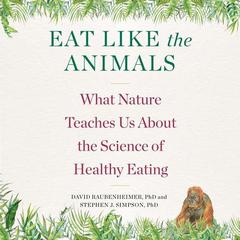 Play Audiobook Sample
Play Audiobook Sample
Eat Like the Animals: What Nature Teaches Us about the Science of Healthy Eating Audiobook
 Play Audiobook Sample
Play Audiobook Sample
Quick Stats About this Audiobook
Total Audiobook Chapters:
Longest Chapter Length:
Shortest Chapter Length:
Average Chapter Length:
Audiobooks by this Author:
Publisher Description
Tapping into nature and the power of protein to tell us what to eat, when to eat, how to control weight and how to live longer.
How is it that a baboon, a cat and a locust instinctively know what to eat for balanced nutrition, and we humans can't seem to figure it out?
Mixing a nutritionally balanced diet, with a precise ratio of protein to carbohydrate, seems daunting, but animals, from apes to cockroaches, all manage it instinctively. It comes down to the essential role of appetite to communicate the body's needs to the brain. Humans have this ability too, but our appetites have been hijacked in the modern food environment, causing obesity and the serious diseases that come with it.
David Raubenheimer and Stephen J. Simpson have been studying appetite in animals, transforming the science of nutrition with their findings. In Eat Like the Animals they take us on a journey from jungle to laboratory and back to our own kitchens to understand how and why we eat, how appetites are fed and regulated, and how, in the end, it all comes down to protein.
Armed with this knowledge, they explain simple steps you can take towards eating a more natural diet for optimal health and a longer life.
PRAISE
'Eat Like the Animals is a wonderfully clever and unusual introduction to the science of healthy eating. I loved the way it was written, and I found it full of drama, insight and surprise. Raubenheimer and Simpson make a very compelling case for the importance of protein in regulating our hunger and very powerfully demonstrate the horrific role that the junk food industry has played in our lives. Essential reading' - Dr Michael Mosley, science presenter and author of The Fast 800
'At last a book on diet and nutrition that makes sense. In a world awash with misinformation about what and when to eat, Eat Like the Animals is a breath of fresh air. I couldn't put it down. Based on more than 30 years of cutting-edge research, it explains how the modern food environment hacks our hunger control system then explains what we all should be eating to live healthily and age well' - David Sinclair, Professor of Genetics and co-Director of the Paul F. Glenn Center for the Biology of Aging, Harvard Medical School, and author of Lifespan: Why We Age-and Why We Don't Have To
'Eat Like the Animals is a must-read. This beautifully written book proposes a highly original and compelling explanation for why so many of us gain weight in today's over-processed food environment. Raubenheimer and Simpson are biologists who use their deep knowledge of animal and insect physiology, evolution, and feeding behavior to construct a compelling hypothesis: we share with animals an innate appetite for protein that regulates what we eat' - Marion Nestle, Professor of Nutrition, Food Studies, and Public Health, Emerita, New York University, and author of Unsavory Truth
'Eat Like the Animals is quite simply a masterpiece. I am completely blown away by the science and enthralled by the clarity and elegance of the writing. Raubenheimer and Simpson have revealed the deep evolutionary secrets of the most important physiological need any animal faces by asking the right questions, and have eviscerated all the charlatans, quacks and pseudoscientists who seek fame and fortune by peddling rubbish. The story the authors have told is very important - more so than many people will realise' - Dr George McGavin, zoologist and broadcaster
Download and start listening now!
Eat Like the Animals Listener Reviews
Be the first to write a review about this audiobook!
About the Authors
David Raubenheimer, PhD, is the Leonard P. Ullman Professor of Nutritional Ecology in the School of Life and Environmental Sciences, and Nutrition Theme Leader in the Charles Perkins Center at the University of Sydney. He lectures extensively at universities and conferences around the world. He is the co-author with Stephen J. Simpson of The Nature of Nutrition: A Unifying Framework from Animal Adaptation to Human Obesity.
Stephen J. Simpson, PhD, is academic director of the Charles Perkins Center and professor in the School of Life and Environmental Sciences at the University of Sydney. He is the recipient of the numerous awards, a Fellow of the Royal Society of London, and a Companion of the Order of Australia. He has appeared on National Geographic, Animal Planet, and the history channels in the United Kingdom and also as the presenter of a four-part documentary series for ABC TV, “Great Southern Land.”




